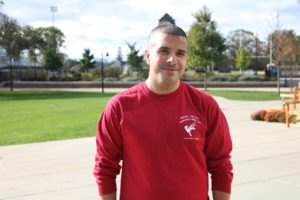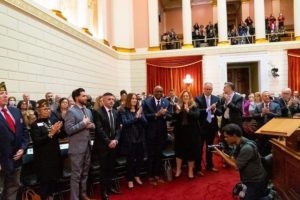As a student, Jonathan Dator overcame a serious health setback through resilience, support

Dr. Jonathan Dator
When considering where to attend college, many high school students look at the academic programs offered, the social activities, the location and the cost. It probably doesn’t enter their minds that the culture of caring and support for students is something they should consider. But for Jonathan Dator, the support he found at Western Connecticut State University enabled him to overcome a life-changing health situation and continue his undergraduate Psychology studies at WCSU before obtaining a Ph.D. in Counseling Psychology at a major New Jersey university.
Dator, a Bethel resident, worked part-time at the Grassy Plain YMCA while in high school and enjoyed interacting with 2nd through 4th graders in their after-school program. He looked at several universities and ultimately decided he felt most comfortable commuting from home to WCSU, where he enrolled undeclared, hoping to discover what resonated with him. In his sophomore year he took Psychology of Personality and Abnormal Psychology and thought, “maybe this is something I could see myself doing for a career.”
As spring of his sophomore year approached, Dator realized he was beginning to have vision problems. He shrugged it off until he found himself in front of his Interpersonal Communication class about to give a presentation — and realized he couldn’t see his index cards. After class, his professor, Khalda Logan, approached him and asked what was wrong. Her compassion was the first sign of what Dator would experience for the rest of his time at WCSU.
“I went to see an eye doctor in Danbury and was sent to Columbia University Irving Medical Center in New York City for a DNA test,” Dator recalled. “The doctor suspected a rare genetic disorder, and because I was adopted, I didn’t know my family history.”
Unfortunately for Dator, the doctor’s suspicions were confirmed: he had Leber’s Hereditary Optic Neuropathy, an optic nerve disease for which there is no treatment. His prognosis was that he would likely go legally blind within months. Despondent, Dator gave up his car and pondered a future where he would not be able to finish college or find work.
After falling below a 2.0 GPA for the semester, Dator met with the AccessAbility Office and learned about accommodations available to him such as having note-takers and more time for tests. “I was a first-generation student and had no idea these kinds of things were available to me,” he said. “I didn’t realize I could have even taken a semester off to regroup. I hadn’t really taken school very seriously until then, but now I realized I had to figure out what I wanted to do and concentrate in order to achieve it.”
He decided to continue his studies in Psychology, and in his Brain & Behavior class, he found a supportive ally in Dr. Robin Gustafson. “She really helped me get through school,” Dator said. “We had many discussions about the brain, neurology, and how it related to what I was going through. Because I couldn’t read, she would let me take my tests verbally, with her reading me the questions and me responding. My other psychology professors, Drs. Mary Nelson, Tara Kuther and David Sheskin, also were incredibly caring and supportive — making sure I had my textbooks on tape, emailing me their class presentation slides in advance, and encouraging me to use the library’s zoom text technology to turn in my papers, even though it took longer. Dr. Nelson would assign a top student to work one-on-one with me because statistics was such a visual subject, and I was missing things.”
Dator ended up co-presenting at Western Research Day in 2006 with fellow student Eliana Santiago — something he could not have imagined accomplishing when first diagnosed. He also recognized he was on a path toward being able to mesh his interests in working with children and psychology.
“Everyone at WCSU wants you to do well,” Dator said. “They want you to succeed and everyone is willing to help you because they care. I was so vulnerable at that point in my life, and the faculty gave me so much reassurance. No matter how hard things are, someone at WCSU will help you figure it out.”
Dator’s professors not only motivated him to learn more about psychology, they also inspired him to learn more about himself. He traveled to Costa Rica and met his biological family, including three brothers and a sister. None of them shared his genetic disorder, but he did find out later that he had two cousins who did. “I felt blessed to be in the U.S. where we have the medical resources that my family of origin lacks in Costa Rica. What was also instrumental was how supportive and encouraging my parents William and Carol Dator were during the entire adjustment process,” Dator said.
Despite losing his entire central vision within two months, Dator prevailed, aided by the concern and support of his professors, and graduated with a Bachelor of Arts in Psychology in 2007. From there, he went on to earn a Master of Education in Counseling from Boston University, a Ph.D. in Counseling Psychology from Seton Hall University, a post-Master’s Certificate in Global Mental Health from Harvard Medical School and a post-Doctoral Master of Science in Clinical Psychopharmacology from Fairleigh Dickinson University.
Dator is currently the Associate Director of Training at the Personal Counseling Center at Providence College in Rhode Island. He is a Licensed Psychologist and Credentialed Health Service Provider specializing in multi-cultural psychology with a focus on LGBTQIA+ and disability issues. He offers individual and group therapy and supervises interns who are in the process of obtaining their Ph.D. in Psychology.

Dator received a standing ovation in the House Chamber of the Rhode Island State House along with Amin Faqiry, the Afghan translator he helped resettle, during the State of the State Address by Gov. Dan McKee.
He was honored in the Rhode Island State House recently for his work with the nonprofit No One Left Behind, which helps those who worked with the U.S. Military get their Special Immigrant Visas to move to the U.S. Through this organization, Dator befriended Afghan interpreter Amin Faqiry, and assisted with securing the funds for Faqiry to move himself, his pregnant wife and four children from their hometown in Afghanistan to Kabul, then to Qatar, and Fort Dix in New Jersey. Because of his friendship with Dator, Faqiry ultimately decided to move his family to Rhode Island, becoming the first Afghan evacuees to settle in the state.
In some ways, Dator’s work with No One Left Behind seems similar to what he experienced as an undergraduate at WCSU. In this case, he is the one who has aided someone who is struggling with their situation and made sure they have the tools needed to successfully overcome it. The caring and support his professors at WCSU provided during such a difficult time in his life have remained with Dator to this day.
“The fact that my professors went out of their way to make sure I could succeed and said, ‘you’re going to need this help to get through this’ are what I’ve taken with me ever since,” Dator said. “You have to show not only your talents, but also your struggles. You have to learn to ask for and accept help. The parts of my identity that I once feared — being First Generation, born outside of the U.S., having a disability and identifying with the LGBTQIA+ community — now give me the greatest satisfaction in my work.
“My time at WCSU changed my life as it taught me things can still be okay even while working through difficult life transitions. I now have doctoral and master’s degrees, but still proudly display my WCSU diploma in my office. It represents resilience. It represents me. Because of this, I maintain relationships with my professors to this day, and I’m grateful for that.”
Western Connecticut State University changes lives by providing all students with a high-quality education that fosters their growth as individuals, scholars, professionals and leaders in a global society. Our vision: To be widely recognized as a premier public university with outstanding teachers and scholars who prepare students to contribute to the world in a meaningful way.

